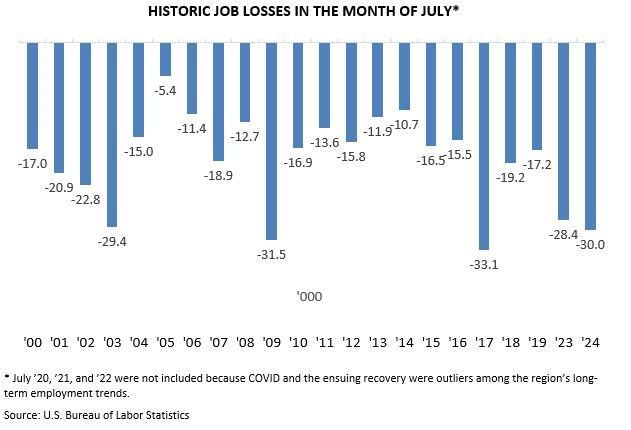July saw a significant downturn in Houston’s job market, with over 35,000 positions lost across the region, according to experts cited by ABC13 Houston. The education sector emerged as the hardest hit, bearing the brunt of the layoffs amid ongoing economic challenges. This article explores the factors contributing to the steep employment decline and its potential impact on Houston’s workforce and communities.
July Job Losses in Houston Exceed 35,000 Impacting Multiple Sectors
Houston’s labor market faced significant challenges in July as over 35,000 jobs were lost across diverse industries. The education sector bore the brunt of this downturn, with numerous school districts reporting layoffs and hiring freezes. Experts have pointed to budget shortfalls and declining enrollment rates as primary contributors to the sector’s vulnerability. Close behind, hospitality and retail sectors also experienced sharp contractions, with businesses struggling to keep pace amid economic uncertainties and shifting consumer behavior.
The widespread job losses have triggered concerns about the broader economic implications for the region. Key affected sectors include:
- Education: Largest job cuts due to funding gaps and enrollment dips
- Hospitality: Declines in tourism and events impacting staffing levels
- Retail: Shift towards online shopping reducing in-store employment
- Manufacturing: Supply chain disruptions causing temporary shutdowns
| Sector | Jobs Lost | Percentage of Total |
|---|---|---|
| Education | 14,500 | 41% |
| Hospitality | 8,200 | 23% |
| Retail | 6,700 | 19% |
| Manufacturing | 5,700 | 16% |
Education Sector Faces Steepest Decline Amid Economic Downturn
The recent economic downturn has forced critical budget cuts throughout Houston’s public and private education systems, leading to an unprecedented wave of layoffs. School districts across the city have reported closures of numerous support programs and the freezing of new hires, compounding the challenges faced by educators and administrative staff. Experts highlight that educators are dealing with reduced funding for classroom resources and professional development, severely impacting teaching quality and student engagement.
Key factors driving the sector’s steep decline include:
- Decreased local and state tax revenues resulting in slashed education budgets
- Prolonged uncertainty over federal assistance and stimulus allocations
- Declining enrollment as families relocate due to economic pressures
- Rising operational costs without corresponding funding increases
| Sector | Job Losses in July | Percentage of Total Losses |
|---|---|---|
| Education | 12,400 | 35% |
| Healthcare | 6,200 | 18% |
| Retail | 5,700 | 16% |
| Manufacturing | 4,500 | 13% |
| Others | 6,300 | 18% |
Experts Analyze Causes Behind Sharp Employment Drop in Houston
Economic specialists point to a combination of external pressures and local policy shifts as primary drivers behind the staggering July employment decline in Houston. The education sector, in particular, experienced the most significant setbacks, with over 12,000 positions lost amidst budget cuts and declining student enrollment numbers. Analysts suggest that these cuts stem from both the lingering effects of pandemic-related funding reallocations and the recent changes in state education mandates.
Additional contributing factors identified include:
- Rising operational costs prompting educational institutions to reduce staffing.
- Sector-wide adoption of remote learning models decreasing demand for support staff.
- A slowdown in oil and gas investments affecting peripheral job markets.
| Sector | Job Losses | Percent Change |
|---|---|---|
| Education | 12,300 | –8.4% |
| Hospitality | 7,800 | –5.1% |
| Healthcare | 5,200 | –3.7% |
Strategies and Recommendations to Support Recovery in Hardest-Hit Industries
In response to the severe job losses, particularly within the education sector, experts advocate for a multi-pronged approach focusing on immediate relief and long-term resilience. Prioritizing investment in digital infrastructure and flexible learning models can help educational institutions adapt and retain staff while expanding accessibility. Meanwhile, targeted government grants and subsidies aimed at hardest-hit industries such as hospitality, retail, and manufacturing are crucial to prevent further layoffs and stimulate rehiring.
Additionally, workforce retraining programs tailored to emerging sectors, including technology, healthcare, and green energy, present viable pathways to stabilize employment rates in Houston. Employers and policymakers are encouraged to collaborate on sustainable strategies that include:
- Upskilling initiatives aligned with market demands to enhance labor market adaptability.
- Public-private partnerships to fund sector-specific recovery projects.
- Community outreach efforts focusing on marginalized groups most affected by the downturn.
| Strategy | Target Industry | Expected Outcome |
|---|---|---|
| Digital Learning Expansion | Education | Staff Retention & Accessibility |
| Workforce Retraining | Multiple Sectors | Labor Market Adaptability |
| Targeted Grants/Subsidies | Hospitality, Retail, Manufacturing | Job Preservation & Rehiring |
To Wrap It Up
As Houston grapples with the economic impact of July’s job losses, experts emphasize the urgent need for targeted support—particularly within the education sector, which has suffered the most significant setbacks. Stakeholders and policymakers face mounting pressure to implement strategies that can stabilize the local workforce and foster recovery in the months ahead. With nearly 35,000 jobs lost, the city’s economic resilience will be tested as it seeks to rebound from this challenging downturn.

